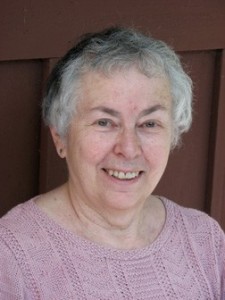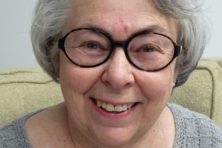Door County Poet Profile: Judy Roy
- Share
- Tweet
- Pin
- Share

Home: In the woods, north of Baileys Harbor
Favorite poet: Jane Kenyon
Favorite poem: “Let Evening Come” by Jane Kenyon
Favorite books of poetry: Otherwise by Jane Kenyon and An Exchange of Gifts by Alden Nowlan
Structured or free verse: Free verse
Favorite themes: I’m open to almost everything
Inspiration: People and their interactions
Where do you write? In my living room, sitting on my favorite loveseat, which my husband calls “the office.”
How often do you write? Sometimes everyday, sometimes weeks go by without writing. I write when something gets under my skin, so to speak, and itches to get out.
How many drafts do your go through? Very many. I write longhand, then revise until the poem is no longer readable, at which time I put it on the computer, revise some more, and finally print and save. But even then, I still go back and revise from time to time. It is rare that my poems are definitively finished.
Any advice to beginning poets? Read poetry, write and revise, take classes, join a critiquing group and listen to more experienced poets, both in terms of hearing their poetry and heeding their critiques.
Where can readers find your poetry? I have published two chapbooks, the first, Slightly Off Q, with June Nirschl and Nancy Rafal, and the second, Two Off Q, with June.
Daughter of Daughters
By Judy Roy
Child, you do not know
the woman you call Mama.
You see an enforcer, restrainer, container,
interloper who stole first place with Dad.
You are an expert at the eye roll,
arm fold, exasperated sigh.
Open your heart. See
the woman who bore you, loves you
with an acceptance no one else
will ever match,
who has dimensions you’ve never fathomed,
likes, delights, tears, fears
akin to yours.
Hurry, Girl, hurry.
Reach, listen, know
this woman while you can. Imagine
the questions you’ll want answered
when she’s gone.
Ask as she has not asked me,
too full of her Now
to have room for where I am.
And I wanting to tell, afraid to begin,
lost between my reality and her interpretation.
As for my own mother, eleven years dead
but longer gone, I’ve lost the sound
of her voice. I’ll never know
her pain, her source of strength,
what made her cringe or reach with joy.
I too saw what I needed to see,
never who she was.
Now questions and speculation
mingle with regret.
Did she feel so after her mother’s death,
dour, grim, critical Grandmother
whose pain must have been as hard and heavy
as the lump on her back,
Grandmother who left home at seventeen
never to return, speak her language,
hear her mother’s voice again?
Listen, Baby, listen now.
Know your Mama while you can.

